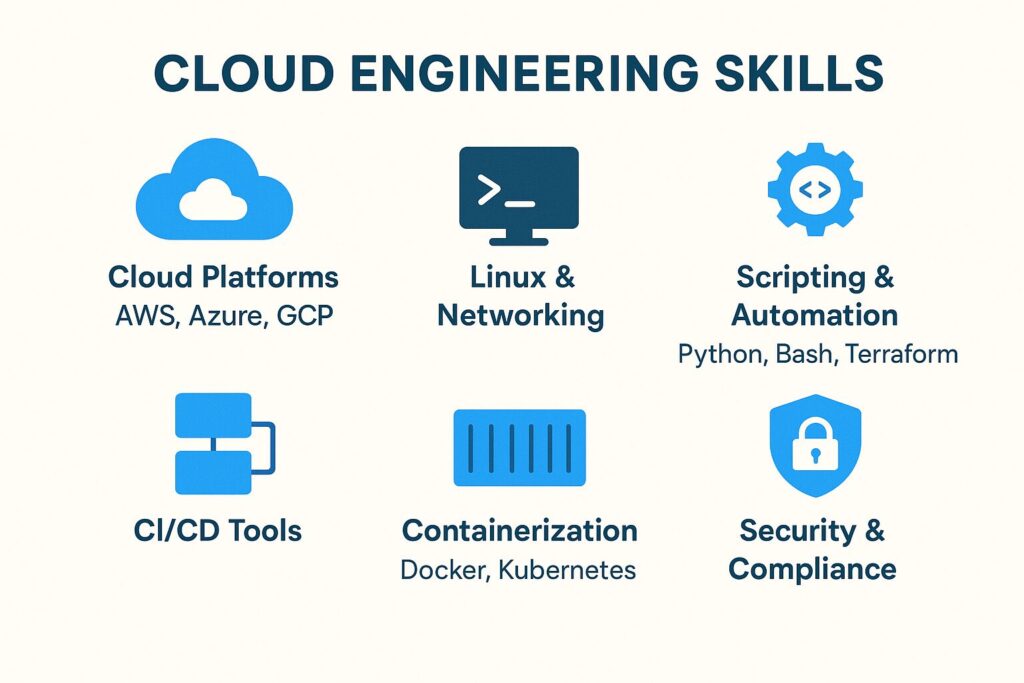The demand for skilled cloud engineers has exploded over the past few years — and 2025 is shaping up to be an even bigger year. As organizations adopt multi-cloud strategies, embrace AI, and scale their infrastructure globally, mastering the right cloud engineering skills is what sets top talent apart.
Whether you’re a beginner exploring cloud computing skills for beginners or an experienced IT professional looking to upskill, this guide breaks down the top cloud engineering skills for freshers and professionals that employers are actively hiring for in 2025 — plus how to build them efficiently.
Why Cloud Engineering Is a Career to Invest In
The cloud has become the backbone of modern business. From startups to Fortune 500s, companies are migrating their operations to platforms like AWS, Azure, and Google Cloud to improve scalability, resilience, and cost-efficiency.
The result? Cloud computing skills are in demand more than ever. According to Emerging Jobs Report, roles related to cloud infrastructure consistently rank among the most in-demand tech careers, with strong salaries and remote work opportunities.
If you’re planning your next move, understanding the technical skills required for cloud computing is one of the smartest career decisions you can make.
1. Mastery of Cloud Platforms (AWS, Azure, GCP)

At the core of cloud engineering is deep familiarity with at least one major cloud platform. AWS remains the market leader, but multi-cloud expertise is increasingly valued. Employers look for engineers who understand how to:
- Deploy and manage resources on AWS, Azure, or GCP
- Navigate cloud consoles and CLIs efficiently
- Use key services (e.g., EC2, S3, IAM, Cloud Functions)
- Prepare for certifications like AWS Solutions Architect or Azure Administrator
A great starting point is to follow a structured Cloud Engineer roadmap that walks you through fundamentals before diving into complex architectures. WeCloudData’s Cloud Engineering Track is designed to do exactly that — blending hands-on labs with career-focused projects.
2. Infrastructure as Code (IaC) & Automation
Gone are the days of manual server configuration. Modern cloud engineers rely on Infrastructure as Code (IaC) to automate and manage deployments at scale.
Tools like Terraform, AWS CloudFormation, and Ansible are now core skills. With IaC, engineers can:
- Version control their infrastructure like code
- Deploy consistent environments across teams
- Reduce errors and speed up release cycles
This is a critical part of cloud computing engineer skills, especially as organizations adopt DevOps and MLOps practices.
3. Containers, Orchestration & Serverless
Containerization and serverless computing have transformed how applications are built and deployed. Docker is the go-to for packaging applications, while Kubernetes dominates orchestration.
Cloud engineers need to know how to:
- Containerize applications for portability
- Deploy and scale services using Kubernetes
- Leverage serverless functions for cost-effective architectures (e.g., AWS Lambda, Azure Functions)
These are fundamental cloud engineer skills for modern infrastructure, helping teams ship software faster, reduce infrastructure costs, and build more resilient systems.
4. Cloud Security & Compliance
With great scale comes great responsibility — and security is now a non-negotiable skill for cloud engineers.
Organizations need professionals who understand:
- Identity and Access Management (IAM)
- Data encryption and secure storage
- Network security (VPCs, firewalls, load balancers)
- Compliance frameworks (GDPR, HIPAA, SOC 2)
AWS cloud engineer skills and Azure cloud engineer skills both emphasize security fundamentals, and in 2025, these will remain top priorities for employers.
5. Monitoring, Optimization & Cost Management
The cloud makes scaling easy — but without monitoring and cost optimization, it can become expensive fast.
Top engineers know how to:
- Use observability tools (CloudWatch, Prometheus, Datadog)
- Set up alerts for performance or security anomalies
- Analyze usage to optimize costs across services
With companies moving to multi-cloud strategies, engineers who can monitor systems effectively and keep cloud bills under control are in high demand.
6. Scripting, API Integration & Programming
While you don’t need to be a full-time software developer, cloud engineers must understand programming and scripting to automate tasks and integrate systems.
Languages like Python and Bash are foundational for:
- Writing deployment scripts
- Working with APIs for custom workflows
- Automating infrastructure setup
7. Soft Skills, Continuous Learning & Multi-Cloud Strategy
Finally, technical skills alone aren’t enough. The best cloud engineers in 2025 also excel at:
- Communicating complex ideas to non-technical teams
- Collaborating across DevOps, Data, and Security functions
- Staying current with evolving tools, certifications, and vendor strategies
This adaptability is what helps your cloud computing skills resume stand out in a competitive job market.
Learn Cloud Engineering with WeCloudData
Learning cloud engineering isn’t about jumping randomly between tutorials. The fastest and most effective way is to follow a structured, project-based learning path that builds your skills in the right order.
At WeCloudData, the Cloud Engineering Track is designed to:
- Teach you core cloud concepts (AWS, Azure, GCP)
- Build practical skills with Terraform, Docker, and Kubernetes
- Introduce security, monitoring, and DevOps workflows
- Prepare you for real-world cloud projects and certifications
Whether you’re upskilling or starting fresh, this track helps you move from theory to job-ready experience. If you are an organization hoping to upskill your team in cloud engineering skillset, WeCloudData offers customized corporate training for teams.
FAQs: Your Cloud Engineering Questions Answered
Q1: Do I need to learn all three cloud platforms?
Not necessarily. Start with one (e.g., AWS) and build solid foundations. Multi-cloud skills become valuable later in your career.
Q2: Which certification should I get first for cloud engineering?
Most learners start with AWS Certified Cloud Practitioner or AWS Solutions Architect Associate. Azure and GCP also offer beginner-friendly equivalents.
Q3: Is scripting really necessary for cloud engineers?
Yes — even basic scripting in Python or Bash will help automate tasks, manage resources, and work with APIs more effectively.Q4: How long does it take to become job-ready in cloud engineering?
On average, 4–8 months of consistent learning with hands-on projects is enough to build strong foundations and prepare for entry-level roles.

